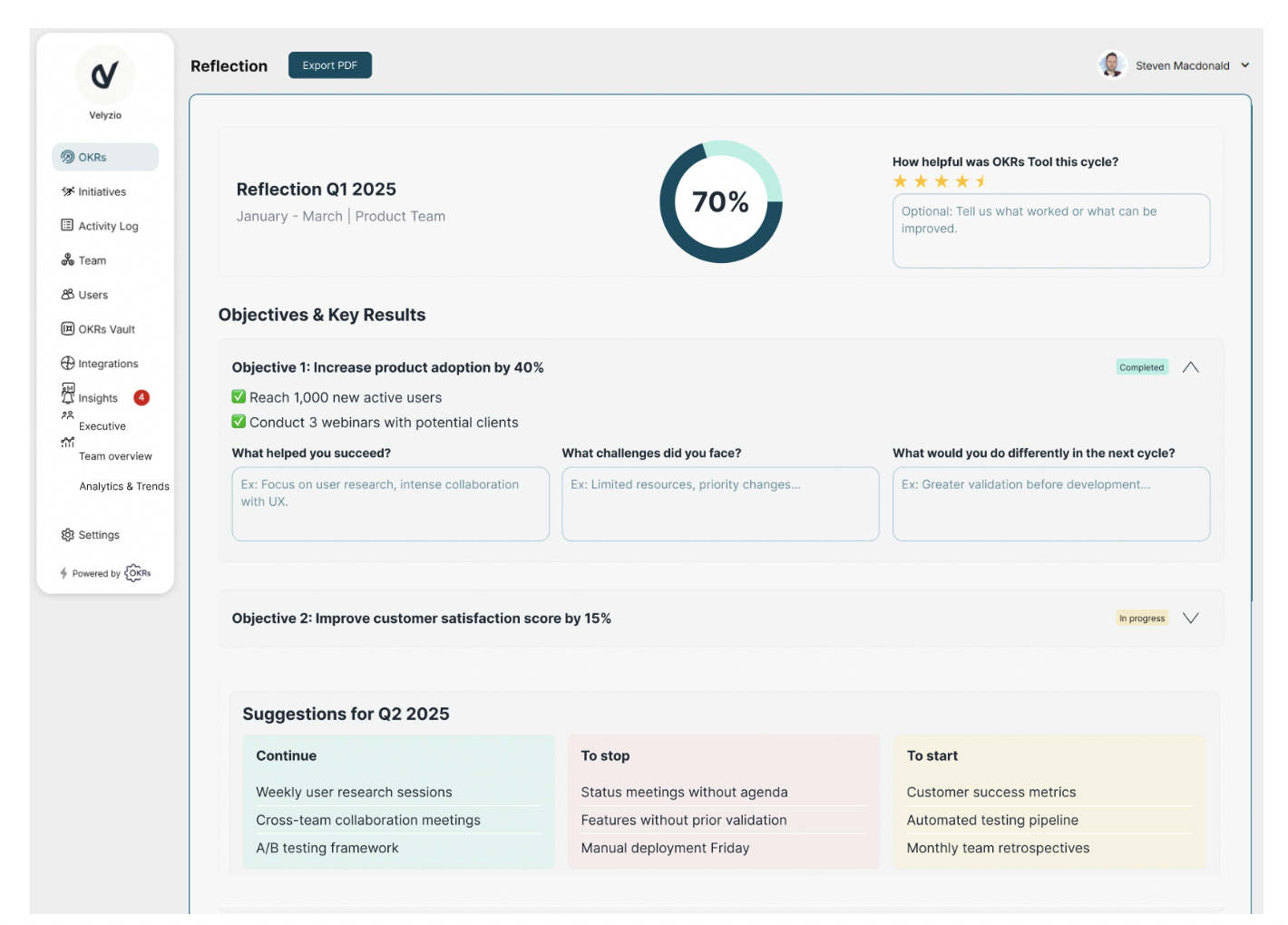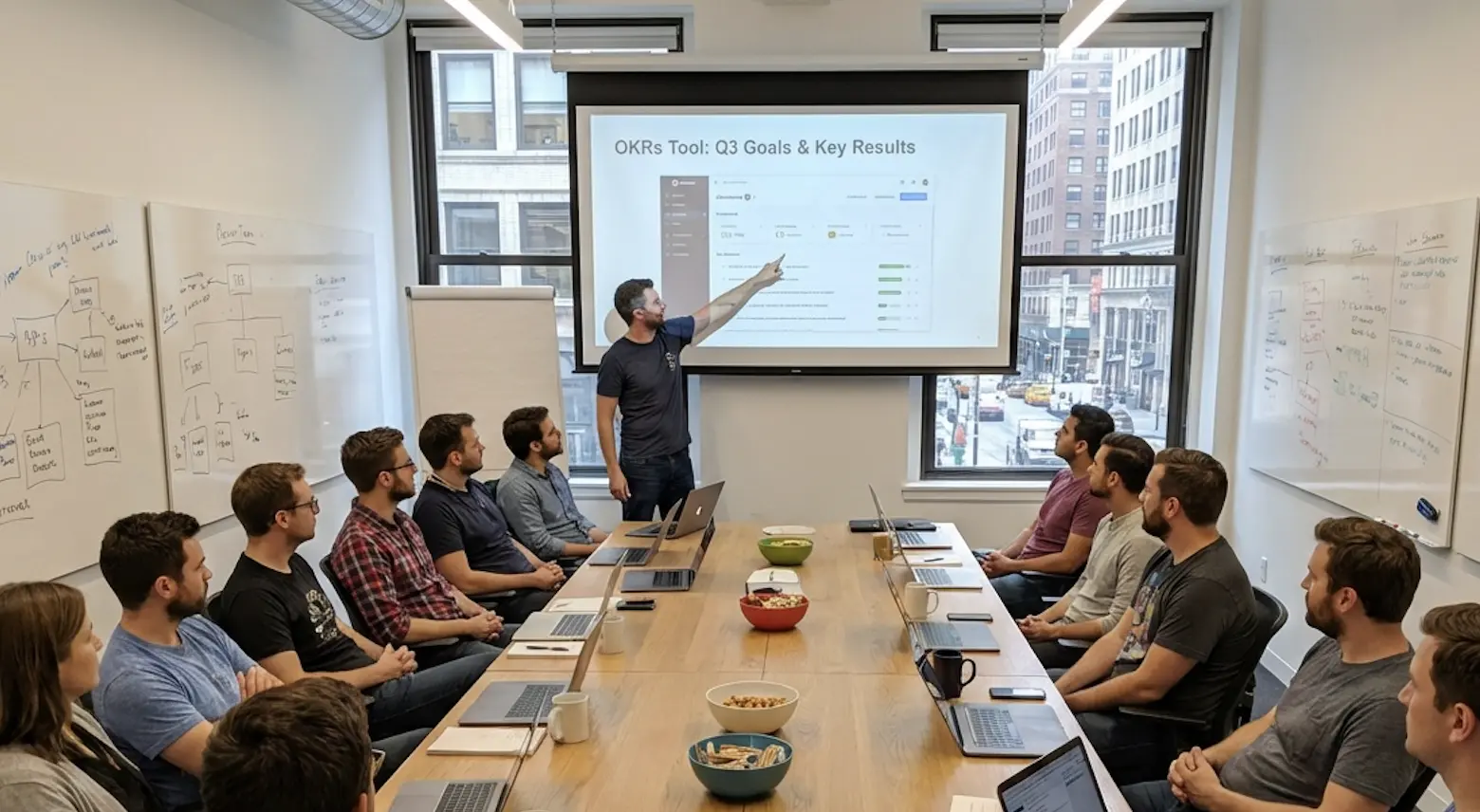Most teams treat OKRs like a checklist:
- Set goals at the start of the quarter
- Forget about them
- Panic before the deadline
- Roll into the next cycle without looking back
The real power of OKRs doesn’t come from setting them - it comes from reflecting on them.
Because if you never stop to ask, “Did we focus on the right things? Did we actually move the needle?” - you’re just setting goals for the sake of it. And in a startup, that’s fatal.
Reflection isn’t just a nice-to-have. It’s a growth lever. Done right, it helps you:
- Learn from your wins (and misses)
- Get sharper with each cycle
- Build team-wide accountability
- Avoid wasting another 90 days on the wrong goals
This guide walks you through how to run an OKR reflection that’s short, honest, and game-changing - even for a 5-person team moving fast.
Why Reflection Matters More Than You Think
Small teams don’t have time or budget to waste. Every cycle has to count.
That’s why reflection is so important. Because:
1. You move too fast not to pause
Startups move quickly by nature. But speed without feedback leads to drift. A 60-minute reflection can correct weeks of misalignment.
2. OKRs aren’t self-correcting
You can write perfect OKRs, but if you never revisit them - or understand why some failed - they’re just words. Reflection makes goals useful.
3. Habits don’t form without loops
Progress isn’t made in sprints alone. It’s built through loops - cycles of setting, doing, and reflecting. That’s how execution becomes culture.
What Happens When You Skip Reflection
Skipping reflection might save you 30 minutes - but it’ll cost you much more in the long run.
When small teams don’t pause to evaluate their OKRs:
- Goals drift quarter after quarter
- The same mistakes get repeated
- Execution problems go unnoticed
- Morale drops, because wins aren’t celebrated
- OKRs become “set and forget” instead of strategic drivers
Startups don’t have time for waste. You need fast feedback loops. Reflection turns your goal system into a learning system - one that sharpens focus every quarter.
Without reflection, you’re not iterating. You’re guessing.
Real Stories: How Reflection Drives Better Outcomes
Reflection isn’t just a ritual. It’s a multiplier.
Here’s what real-founders had to say about using reflection to level up:
“We missed a major Key Result, but during reflection we realized the KR wasn’t achievable - it relied on a partner launch outside our control. We rewrote it more tightly next time and nailed it.”
“Our team felt OKRs weren’t working. In reflection, we found out we weren’t actually checking in at all. We added a 10-minute async Slack update every Friday. It changed everything.”
Use your end-of-cycle debriefs not just to look back - but to look forward with clarity
When to Run an OKR Reflection
Timing matters.
Run your reflection in the final week of your OKR cycle, before setting new ones.
You can do:
- A live 45–60 minute session with your team
- Written reflections first, followed by a group sync
- Individual reflections for small or async teams
The important thing: Don’t skip it. And don’t treat it like a performance review - it’s a learning tool.
How to Run a High-Impact OKR Reflection
Here’s a simple 5-part structure any team can use - with or without OKR software.
1. Score Your Key Results
Use a simple, shared language for evaluating each KR:
No need for decimals beyond that. This isn’t a test - it’s a signal.
Pro tip: Always score before you reflect. It forces clarity and gets everyone on the same page.
2. Ask: What Worked?
Use prompts like:
- Which goals had strong momentum?
- What helped us stay focused or aligned?
- Where did habits or tools support progress?
Highlight the wins and what made them possible. This is how you identify repeatable success.
Example insight: “Mid-quarter check-ins helped us catch blockers early - that needs to be part of every cycle.”
3. Ask: What Didn’t Work - and Why?
Now look at what missed the mark. Not to assign blame - but to get smarter.
Prompts:
- What slowed us down or caused confusion?
- Did any OKRs drift or get deprioritized?
- Were ownership, timelines, or expectations unclear?
Your goal is to surface patterns, not vent. It’s not about fault. It’s about improving the system.
Example insight: “Half the team forgot their OKRs after month one. We need async reminders baked in.”
4. Identify What You’ll Do Differently
This is the payoff.
Every OKR reflection should end with 2–4 takeaways you’ll apply next cycle. These become your operating improvements.
Examples:
- “Cap each team to 3 objectives max.”
- “Assign a KR owner, not just a team.”
- “Add a midpoint scoring session.”
If you don’t change anything, the reflection didn’t work.
5. Close the Loop
Make it easy to document and share the reflection:
- Drop it in Notion or Google Docs
- Link it to next cycle’s OKRs
- Make it part of your planning kickoff
Reflection isn’t a one-off ritual. It’s part of a continuous feedback loop. Don’t let it get buried in a Slack thread.
How to Make Reflection a Team Habit
Founders often run reflections solo.
But the real value comes when you open the process up to your team.
Here’s how to bring everyone into the loop:
- Share reflection prompts in advance – Let people think before they speak
- Allow async input – Collect comments in Notion or Slack
- Make it safe – Focus on learning, not blame
- Celebrate wins and name blockers – Both matter
- Time-box it – Even 30 minutes can spark huge improvements
When teams co-own the learning, they’re more likely to co-own the execution too.
Use Reflection to Improve Next Cycle’s OKRs
Reflection doesn’t end when the quarter does. It should actively shape your next one.
Use your takeaways to:
- Write tighter, more focused Objectives
- Set fewer, clearer Key Results
- Reevaluate check-in cadence
- Identify what rituals helped - and what didn’t
Ask these 3 questions before you write new OKRs:
- Where did we overreach or under-plan?
- What made a goal “stick” this time?
- What distracted us - and how can we avoid it?
OKR reflection isn’t the end of a cycle. It’s the start of a better one.
Turn Reflection Into Real OKR Momentum
Reflection isn’t a recap - it’s a launchpad. Use it to sharpen your strategy, not just summarize it.
Inside OKRs Tool, you can:
- Capture wins, roadblocks, and lessons
- Spot patterns in progress and team habits
- Identify what to double down on — and what to drop
- Get AI suggestions tailored to your next cycle
Your last OKR cycle holds the key to a better one. Unlock it with Reflection.

Final Thoughts
Goals alone don’t make a startup effective. Learning does.
Most teams don’t struggle because they lack ambition - they struggle because they lack focus, feedback, and a system to improve how they work.
Reflection turns OKRs into more than a tracking tool. It makes them a habit. A culture. A way to build momentum that compounds every quarter.
If you’ve skipped reflection before, try this once. Block the hour. Ask the questions. Score the work. And write down what you’ll change.
You don’t need a perfect cycle. You need to get better every cycle.
Use it in Notion, Google Docs, or wherever your team works.






